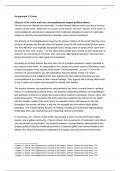------
Assignment 2: Essay
Citizens of the world and how cosmopolitanism shaped political theory
“No one has ever offered me citizenship”1 is what Micheal Walzer had to say about the term
“citizens of the world”. What even is a citizen of the world? The term “citizens of the word” or
cosmopolitanism represented a departure from traditional allegiances based on nationality,
religion or ethnicity and advocated for a broader, more inclusive worldview.
The thinkers of the Enlightenment meant by the phrase “citizens of the world” that they were
loving to all people and thought about the greater cause for the world instead of their nation.
The first definition was originally that people had a strong sense of loyalty which came from
the love for their own country.2 As the article said, people were moved by their tendencies to
stand for the well-being of everyone. This view was called global patriotism3, because they
always focussed on the wider aspect of humankind.
According to Michael Walzer, the term was a bit of a paradox because it wasn’t possible to
be a citizen of the world.4 It’s impossible to be a citizen of a whole cosmos. Rousseau made
a harsh accusation of the citizens of the world: “those pretended…no one.”5 One of the
criticisms of cosmopolitism was the nationalism that was deeply rooted in it. Many
contemporaries of the Enlightenment were attached to their national identities and saw
cosmopolitanism as a threat to their cultural heritage. They argued that a strong attachment
to one’s nation and culture was essential for identity and stability.
The tension between cosmopolitanism and patriotism has been a central theme in political
theory. In contemporary political theory, the dynamic relationship between cosmopolitanism
and patriotism continues to shape discussions about national sovereignty, human rights, and
global governance. The question that arose was how to balance the interest of one nation
with the broader needs of the world and it is a question that is still relevant to this day.
Nowadays this tension still plays a big role, for example the discussions about global
inequality. The United Nations focuses on finding a middle ground between fighting global
challenges while also maintaining and respecting national sovereignty.
In conclusion, the “citizens of the world” represented a vision of universal human rights,
reason, and a global community. It faced criticism from proponents of nationalism and others
who questioned its practicality. The dynamic between cosmopolitanism and patriotism has
shaped political theory by challenging thinkers to balance global and national loyalties and
address the ethical and practical challenges of creating a just and interconnected world.
1
Pagden, A. (2013). The Enlightenment: and why it still matters, Oxford: Oxford University Press, 274.
2
Pagden, A. (2013). The Enlightenment: and why it still matters, Oxford: Oxford University Press, 270.
3
Pagden, A. (2013). The Enlightenment: and why it still matters, Oxford: Oxford University Press, 270.
4
Pagden, A. (2013). The Enlightenment: and why it still matters, Oxford: Oxford University Press, 274.
5
Pagden, A. (2013). The Enlightenment: and why it still matters, Oxford: Oxford University Press, 274.




